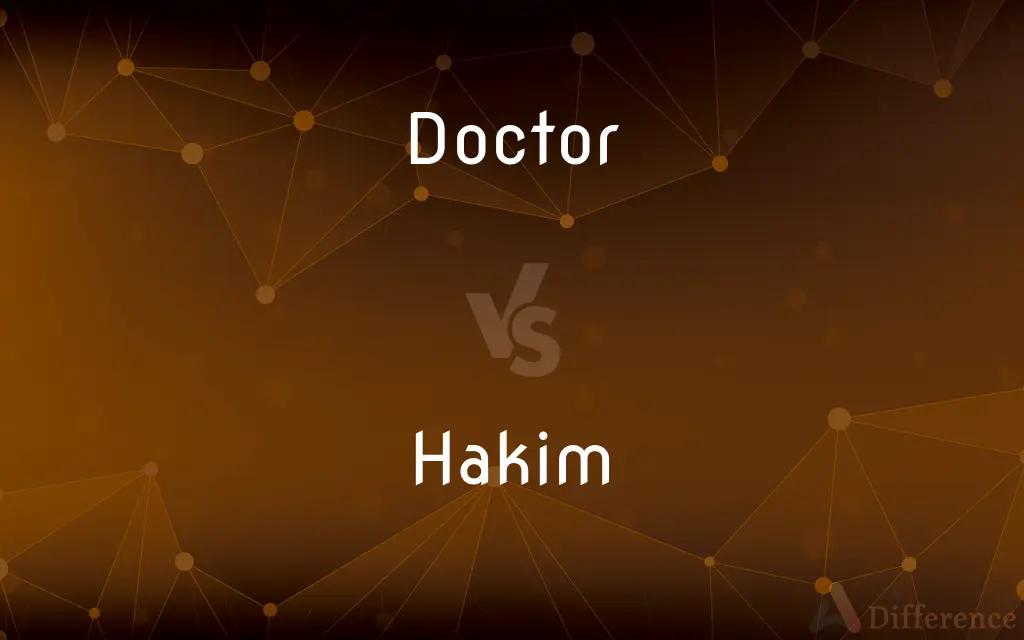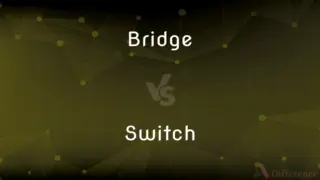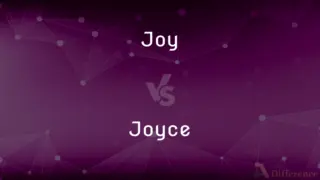Doctor vs. Hakim — What's the Difference?
By Maham Liaqat & Fiza Rafique — Updated on April 3, 2024
A doctor practices modern medicine, focusing on diagnosis and treatment using scientific research, while a Hakim practices traditional Islamic or Unani medicine, emphasizing holistic health and natural remedies.

Difference Between Doctor and Hakim
Table of Contents
ADVERTISEMENT
Key Differences
Doctors are trained in the field of modern medicine, which relies on recent scientific discoveries and technological advancements for diagnosing and treating diseases. They often specialize in specific areas of medicine, such as surgery or pediatrics, and use a wide range of pharmaceuticals and surgeries to treat patients. Whereas, Hakims practice Unani medicine, a traditional system rooted in Greek philosophy that views the body as containing four humors that must be in balance for good health. Hakims use herbal remedies, dietary practices, and lifestyle changes to correct imbalances and treat ailments.
Modern medicine, practiced by doctors, is based on rigorous scientific research, clinical trials, and evidence-based practices. It benefits from the latest technological advancements in medical equipment and pharmaceuticals, offering precise treatments for a vast range of acute and chronic conditions. On the other hand, Hakim's approach to medicine is holistic, focusing on maintaining or restoring the balance within the body and mind. Unani medicine emphasizes the healing power of nature and considers the mental, physical, and spiritual well-being of the patient.
Doctors typically undergo extensive education and training in medical schools, which includes years of study followed by residencies and, often, fellowships in specialized fields. This education is grounded in the principles of western medicine, anatomy, physiology, pharmacology, and pathology. Conversely, Hakims receive their training in institutions that specialize in Unani medicine, where they study the traditional theories of the four humors, the properties of natural substances, and the importance of diet and lifestyle in maintaining health.
The diagnostic methods used by doctors often involve modern technology, such as blood tests, imaging studies like X-rays and MRIs, and other diagnostic procedures to identify diseases and monitor treatment effectiveness. In contrast, Hakims rely on traditional diagnostic methods, including pulse diagnosis, observation, and questioning about lifestyle and diet, to understand the patient's condition and the underlying imbalances causing their symptoms.
While doctors are widely recognized and regulated by medical boards and health organizations worldwide, ensuring a standardized level of care and adherence to ethical guidelines, Hakims also follow a set of traditional ethical guidelines but may face varied levels of regulation depending on the country. This difference affects the recognition and integration of Unani medicine into mainstream healthcare systems globally.
ADVERTISEMENT
Comparison Chart
Basis of Practice
Modern medicine
Unani/traditional medicine
Training
Medical school
Unani medicine institutions
Diagnostic Methods
Technological and laboratory tests
Traditional methods like pulse diagnosis
Treatment Approaches
Pharmaceuticals, surgery
Herbal remedies, dietary and lifestyle changes
Philosophical Foundation
Scientific research
Balance of four humors
Compare with Definitions
Doctor
A licensed medical practitioner specialized in diagnosing and treating illnesses and injuries.
After graduating from medical school, she became a doctor specializing in cardiology.
Hakim
A traditional healer who uses herbal remedies, dietary adjustments, and holistic approaches.
For chronic ailments, the Hakim recommends a combination of natural treatments.
Doctor
An individual holding a doctoral degree in medicine (MD or DO).
Dr. Smith, an experienced doctor, joined the hospital's emergency department.
Hakim
A practitioner of Unani medicine, focusing on natural healing and the balance of bodily humors.
The Hakim suggested herbal tea and lifestyle changes for my insomnia.
Doctor
A specialist in a specific area of medicine, such as pediatrics or oncology.
The pediatric doctor is excellent with children and provides compassionate care.
Hakim
Someone who diagnoses and treats according to the principles of humoral theory.
The Hakim assessed my condition by examining my pulse and prescribed a herbal concoction.
Doctor
A professional who practices modern medicine, using scientific knowledge and clinical experience.
The doctor prescribed medication after carefully reviewing the test results.
Hakim
A professional trained in the ancient medical system of Unani, emphasizing preventative care.
According to the Hakim, maintaining a proper diet is key to preventing diseases.
Doctor
A healthcare provider who offers preventive care and treatment for various health conditions.
My family doctor recommended a balanced diet for better health.
Hakim
A healer who integrates physical, mental, and spiritual wellness in treatment plans.
The Hakim's approach to healing includes meditation and yoga for mental balance.
Doctor
A person who is licensed to practice medicine and has trained at a school of medicine or a school of osteopathic medicine; a physician.
Hakim
A doctor, especially one who practices traditional medicine, in a predominantly Muslim culture.
Doctor
Any of certain other healthcare professionals, such as a dentist, optometrist, chiropractor, podiatrist, or veterinarian.
Hakim
(South Asia) A doctor, usually practicing traditional medicine.
Doctor
A practitioner of alternative medicine or folk medicine who does not have traditional medical credentials.
Hakim
An honorific traditionally applied to a Muslim ruler, provincial governor, or judge.
Doctor
A person who has earned the highest academic degree, usually a PhD, awarded by a college or university in a specified discipline.
Hakim
(historical) A judge or governor in Islamic India.
Doctor
A person awarded an honorary degree by a college or university.
Hakim
A wise man; a physician, esp. a Mohammedan.
Doctor
Abbr. Dr. Used as a title and form of address for a person holding the degree of doctor.
Hakim
A Mohammedan title for a ruler; a judge.
Doctor
Roman Catholic Church An eminent theologian.
Hakim
A Muslim ruler or governor or judge
Doctor
A rig or device contrived for remedying an emergency situation or for doing a special task.
Hakim
A Muslim physician
Doctor
(Informal) To give medical treatment to
"[He] does more than practice medicine. He doctors people. There's a difference" (Charles Kuralt).
Doctor
To repair, especially in a makeshift manner; rig.
Doctor
To falsify or change in such a way as to make favorable to oneself
Doctored the evidence.
Doctor
To add ingredients so as to improve or conceal the taste, appearance, or quality of
Doctor the soup with a dash of sherry.
Doctor
To alter or modify for a specific end
Doctored my standard speech for the small-town audience.
Doctor
(Baseball) To deface or apply a substance to (the ball) in violation of the rules in order to throw a pitch with extraordinary movement
Was ejected because he doctored the ball with a piece of sandpaper.
Doctor
To practice medicine.
Doctor
A physician; a member of the medical profession; one who is trained and licensed to heal the sick or injured. The final examination and qualification may award a doctor degree in which case the post-nominal letters are D.O., DPM, M.D., DMD, DDS, in the US or MBBS in the UK.
If you still feel unwell tomorrow, see your doctor.
Doctor
A person who has attained a doctorate, such as a Ph.D. or Th.D. or one of many other terminal degrees conferred by a college or university.
Doctor
A veterinarian; a medical practitioner who treats non-human animals.
Doctor
A nickname for a person who has special knowledge or talents to manipulate or arrange transactions.
Doctor
(obsolete) A teacher; one skilled in a profession or a branch of knowledge; a learned man.
Doctor
(dated) Any mechanical contrivance intended to remedy a difficulty or serve some purpose in an exigency.
The doctor of a calico-printing machine, which is a knife to remove superfluous colouring matter
The doctor, or auxiliary engine, also called "donkey engine"
Doctor
A fish, the friar skate.
Doctor
A ship's cook.
Doctor
(transitive) To act as a medical doctor to.
Her children doctored her back to health.
Doctor
To act as a medical doctor.
Doctor
(transitive) To make (someone) into an (academic) doctor; to confer a doctorate upon.
Doctor
(transitive) To physically alter (medically or surgically) a living being in order to change growth or behavior.
They doctored their apple trees by vigorous pruning, and now the dwarfed trees are easier to pick.
We may legally doctor a pet to reduce its libido.
Doctor
(transitive) To genetically alter an extant species.
Mendel's discoveries showed how the evolution of a species may be doctored.
Doctor
(transitive) To alter or make obscure, as with the intention to deceive, especially a document.
To doctor the signature of an instrument with intent to defraud is an example of forgery.
Doctor
(transitive) To adulterate, drug, or poison (drink).
Doctor
To take medicine.
Doctor
A teacher; one skilled in a profession, or branch of knowledge; a learned man.
One of the doctors of Italy, Nicholas Macciavel.
Doctor
An academical title, originally meaning a man so well versed in his department as to be qualified to teach it. Hence: One who has taken the highest degree conferred by a university or college, or has received a diploma of the highest degree; as, a doctor of divinity, of law, of medicine, of music, or of philosophy. Such diplomas may confer an honorary title only.
Doctor
One duly licensed to practice medicine; a member of the medical profession; a physician.
By medicine life may be prolonged, yet deathWill seize the doctor too.
Doctor
Any mechanical contrivance intended to remedy a difficulty or serve some purpose in an exigency; as, the doctor of a calico-printing machine, which is a knife to remove superfluous coloring matter; the doctor, or auxiliary engine, called also donkey engine.
Doctor
The friar skate.
Doctor
To treat as a physician does; to apply remedies to; to repair; as, to doctor a sick man or a broken cart.
Doctor
To confer a doctorate upon; to make a doctor.
Doctor
To tamper with and arrange for one's own purposes; to falsify; to adulterate; as, to doctor election returns; to doctor whisky.
Doctor
To practice physic.
Doctor
A licensed medical practitioner;
I felt so bad I went to see my doctor
Doctor
(Roman Catholic Church) a title conferred on 33 saints who distinguished themselves through the othodoxy of their theological teaching;
The Doctors of the Church greatly influenced Christian thought down to the late Middle Ages
Doctor
Children take the roles of doctor or patient or nurse and pretend they are at the doctor's office;
The children explored each other's bodies by playing the game of doctor
Doctor
A person who holds Ph.D. degree from an academic institution;
She is a doctor of philosophy in physics
Doctor
Alter and make impure, as with the intention to deceive;
Sophisticate rose water with geraniol
Doctor
Give medical treatment to
Doctor
Restore by replacing a part or putting together what is torn or broken;
She repaired her TV set
Repair my shoes please
Common Curiosities
What is the main difference between a doctor and a Hakim?
A doctor practices modern medicine based on scientific research, while a Hakim practices Unani medicine focusing on holistic health and natural remedies.
Is it necessary to choose between a doctor and a Hakim for treatment?
It depends on the individual's health condition and preference for conventional or traditional medicine. Some choose to consult both for complementary care.
Are the treatments offered by doctors and Hakims recognized globally?
Doctors' treatments are widely recognized and regulated globally, while Hakims' traditional treatments have varied recognition and regulation.
How do doctors and Hakims view health and disease?
Doctors view health and disease through the lens of modern medicine, while Hakims view them as a balance or imbalance of bodily humors.
How do doctors and Hakims diagnose diseases?
Doctors use technological and laboratory tests, whereas Hakims rely on traditional methods like pulse diagnosis and observation.
What kind of education is required to become a doctor or a Hakim?
Doctors attend medical schools, while Hakims are trained in institutions specializing in Unani medicine.
Is Unani medicine safe?
Unani medicine, like any healthcare practice, can be safe when practiced by a qualified Hakim, but it's important to consult healthcare professionals.
Can a Hakim perform surgeries?
Typically, Hakims do not perform surgeries; their treatment methods include herbal remedies, dietary, and lifestyle changes.
How long does it take to become a doctor compared to a Hakim?
Both require several years of education and training, but the duration can vary based on the specific requirements of their fields.
Are doctors and Hakims able to treat all kinds of diseases?
Doctors and Hakims have their specialties and limitations, and their effectiveness varies depending on the condition and the treatment approach.
Can Hakim treatments be integrated with modern medicine?
In some cases, Hakim treatments can complement modern medical treatments, but it's important to consult healthcare professionals before combining therapies.
How are chronic conditions treated differently by doctors and Hakims?
Doctors may use long-term pharmaceuticals, while Hakims focus on lifestyle and dietary changes along with natural remedies.
What regulatory bodies oversee the practice of doctors and Hakims?
Doctors are regulated by medical boards and health organizations, while Hakims are subject to traditional medicine regulatory bodies, varying by country.
Do doctors and Hakims prescribe the same types of medication?
No, doctors prescribe pharmaceuticals, while Hakims use herbal and natural remedies.
Share Your Discovery

Previous Comparison
Bridge vs. Switch
Next Comparison
Joy vs. JoyceAuthor Spotlight
Written by
Maham LiaqatCo-written by
Fiza RafiqueFiza Rafique is a skilled content writer at AskDifference.com, where she meticulously refines and enhances written pieces. Drawing from her vast editorial expertise, Fiza ensures clarity, accuracy, and precision in every article. Passionate about language, she continually seeks to elevate the quality of content for readers worldwide.
















































